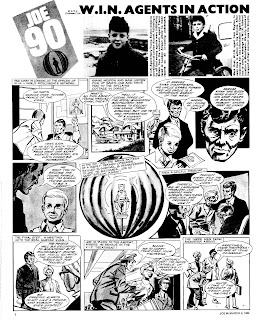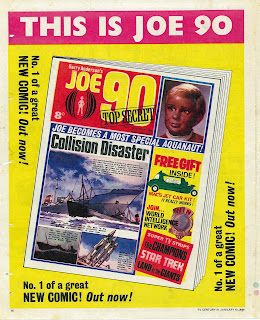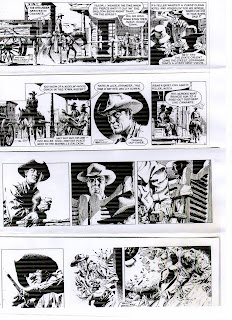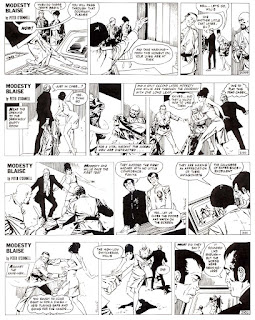 |
The first episode of "Balthus" Daily Mirror 12 October 1971
|
In the previous episode of this series, we looked at the first Bellamy-illustrated Garth story, "Sundance" in detail. This time we are focussing on the second story: "The Cloud of Balthus" which originally ran in Daily Mirror (12 October 1971 - 27 January 1972 - #E237-F23). I've provided example strips to illustrate some of the points, but if you have access to a copy of the full story, follow along!
I must thank David Jackson and Paul Holder for examining the artwork in such depth and detail in order to outline who drew what in this story. David started the whole procedure and I've created another spreadsheet to show which panels we think are purely Frank Bellamy and which have John Allard's work.
It's at this point I should highlight that the aim of doing this is merely to catalogue what artwork Frank Bellamy did and to show what a collaborative process creating the daily production of the strip was. We merely wish to examine and list what is Bellamy's art and what is Allard's, especially as even Bellamy had trouble explaining what went on. It is an open question how FB and JA's roles were contractually defined Bellamy had to collaborate with others on the Dan Dare strip in Eagle and is on record about the situation being awkward with a jarring of styles within the two pages each week for a year. As we hope to see in later stories there's a consistency of style when Bellamy worked alone on the artwork (as there was on the popular Garth stories drawn solely by Allard, before Bellamy came on board).
One interesting aspect of examining this story was that I have never seen any episodes come to auction or sale. If you have any idea where these are, I'd love to know. We worked from any versions we could find including the original crudely printed newspaper cuttings! Many times throughout this story David, Paul and I thought we couldn't be definitive without viewing the original boards.
THE CLOUD OF BALTHUS - An overview of the story:
Garth and Professor Lumière holiday in the Caribbean but news comes that NASA has lost contact with not only the orbiting space platform but also the rescue mission. Garth decides to go skin-diving and leave the Americans to it. Meanwhile a Korean girl, Lee Wan, has been instructed to win over Garth, by whatever means. We learn she is working for Mr Ching and lures Garth to the sea and fires a sedative dart at him before taking him on board Mr. Ching's submarine. His plan is to send Garth to the NASA space platform orbiting the Moon to steal technological secrets. As Lee and Garth explore the outside of the space platform they are being watched by aliens - "Lord Balthus", and other bubble-shaped beings. Garth wants no part of the filming Lee does, but he is sedated again by her and a microfilm hidden in Garth's scalp whilst suddenly the bubble-shaped beings fade into view on the space-platform. Lord Balthus of the Cariads wants to examine this female shape and transports them both across to his ship, where we find the missing astronauts. They are all sent back to earth, after the Cariads destroy the space-platform leaving Garth and Lee Wan aboard the Cariad ship. We learn Balthus has a plan to use them to create new Cariads. Garth discovers sustained vibration affects the Cariads and breaks free, destroying the aliens. On return to Earth in the Cariad ship, they are picked up by a trawler and discover they are world famous. But Garth rightly sees that Mr. Ching will be after them and his agents follow Lumière to Garth's country retreat, where they gas Garth and the Professor. But Lee has proven her loyalty to Garth by helping him destroy the microfilm hidden under his scalp. Garth wakes and chases after the agents, and works with Scotland Yard but Lee has been given an ageing serum to disguise her looks in order to smuggle her back to Mr. Ching. Garth and friends watch the airport, where Garth has suspicions an old lady is Lee. He boards the plane with them, but cannot stop the agents as they threaten to blow up the plane. They force the captain to reduce speed so they can make a parachute jump over the sea. The agent, Lee and Garth are taken abroad Mr. Ching's sub where Lee's good looks are returned. Garth breaks free from his bonds and overpowers Mr. Ching and takes him and Lee to an escape hatch, while forcing the submarine down. A navy frigate rescues them and Lee and Garth plan their return to the Caribbean to finish their holiday.

 |
"Garth: The Cloud of Balthus" E237
|
Interestingly, the opening title strip shows markings on the alien spaceship which do not show up later and John Allard had a hand in adding Letratone to the title strip - which is unusual in the Bellamy Garth run, but as this is the first title strip FB created, perhaps not - as JA and FB are working out who does what at this stage in the run. And where did the name 'Balthus' come from? Maybe Jim Edgar, the author, liked the name of the French artist?
In going through every panel in this story - with 91 daily strips - it was interesting to see a few runs of strips where we are not sure whether John Allard (JA) did backgrounds. In various places we see that JA has actually taken, or more likely had been given space to draw 19 or 20 complete panels, not just backgrounds. Looking at the jarring changes in style in this story we wondered what was going on. Was it because the first Garth story ('Sundance') being Bellamy's first daily strip was too much and he invested so much in it he was having deadline problems? Perhaps he took "his foot off the accelerator" after "Sundance" to allow John Allard room to move? But it could also be that he was still trying to understand how JA and he should work together on the art.
John Allard left school at 14 and at 15 submitted samples of his art to the Mirror offices and started work there as an assistant to Steve Dowling a few months before the creation of Garth in July 1943. Until 1969, when "Despite [Dowling's retirement at 65], John Allard recalled that Dowling “let me do some weeks of it entirely by myself – as Steve thought this would help in my obtaining the job of Garth main artist.” He continued the solo art chores from 1969 until Bellamy joined in 12 July 1971 (publication dates). Read the whole Allard interview here
I think there are 23 whole FB strips with no JA amendments / additions out of the 91 strips and the spreadsheet shows they are scattered throughout the story, so it's not just in one place. There are 5 strips with only two panels (most are three - where 'Sundance' had four sometimes) and some are fantastic examples of Bellamy art.
 |
| "Garth: The Cloud of Balthus" E240 Panel #3 is likely all John Allard |
E238 we see an instance of Allard's Letratone appearing slightly more faint in panel #2. Has he covered some of FB's background art? E240 (above) shows one of the three panels is actually drawn completely by JA - the spaceship. E245 even looks Bellamy-ish in outline but the marks are certainly more Allard-ish with the shark actually having a strangely angled dorsal fin and even the marks on Panel #1's legs appear to be Allard. E247 make us wonder who did what. E251 shows a boat driver resting as Garth chases Lee Wan on the beach. Paul commented "Love the way the guy's boot overhangs the bottom frame of the boat." - breaking the 'fourth wall'! E254 Allard even does the figure work of Garth, Lee Wan and the
boat owner. All three are located on the boat, mid-ground, so it's not
immediately noticeable as JA. We see, in E255 Mr. Ching watching two skin-divers on his screen, but who drew them? I favour FB, but there has been disagreement between us, could JA have added them as background?. In E258 we see a shadow on the bulkhead, with what appear to be two eyes, but is this FB, or just a printing error? In E264 we have a gorgeous Frank Bellamy spaceship design, very similar to his T-Shirt designs.
 |
| "Garth: The Cloud of Balthus" E264 a lovely spaceship design |
In the context of "thought bubbles", David mentioned these being JA (and "pre-FB looking") but I'd thought surely they are plain and simple JA as he lettered and added all lettering. David replied "The word-balloons/pointer and thought-bubbles/pointers (the outlines) all start to look FB style from his first Sundance strip on - except for these two that I've noticed which are both JA early Sundance frames style". So JA did the lettering - no doubts there, but the shape and placement of the balloons is FB...except in a few places where we think Allard changed them for whatever reason.
 |
| "Garth: The Cloud of Balthus" E266 |
E266 is a good example of the FB/JA mix. The figures in panel #1 are Bellamy; the star-field is Bellamy-ish; the design of the spaceship is Bellamy. However, who did the shadowing on the spacesuits? It looks like Allard might have done the star-field copying Bellamy's technique but maybe adding his own 'blobs' (on the left) - sight of the original might show process-white added to the black. But FB drew in this way too, elsewhere in this strip (compare the second frame of E284). And the spaceship although a Bellamy design, is filled-in by JA.
As David reminded me, "Very interestingly, at the time FB was drawing (i.e. before) the Apollo 11 Moon landing, nobody knew that the sky as seen from the Moon would be blank - no stars visible..! The evidence wasn't in until they landed. The explanation for the non-visible stars from the daylight surface of the Moon is because the sunlight thrown up from the surface (although made of very dark material in itself) is so strong the human eye shuts right down from the brightness so can't see any stars. The same goes when in close orbit around the Earth and the daylight surface is large in the field of vision. So before the landing it was a scientific debate as to what would turn out to be the case in fact." Here Bellamy drew stars as this is a story, not a factual account.
In E270 we see a strange addition of heavy cross-hatching (possibly Letratone) where we are used to seeing light backgrounds. Curiously in E271, the great Lord Balthus appears with two of his minions, and after introducing himself demands that Garth and Lee Wan take off their "hideous garments" and reveal themselves. Anyone reading at the end of 1971 felt they knew they'd see Lee Wan standing naked - well at least topless, but no, they both took off only their outer spacesuits and from that alone Balthus could now tell he had a female of our species! Anyway the first panel is interesting showing FB's figure work and left hand control panel, but JA's additions in the background. Paul and David mentioned this: "White on black cross-hatch b/g tone at top right would be JA. The (slightly not exactly parallel thickness) ‘strut’ or construction support, and the hatched vertical lines of work-surface, and the screens at left in (a bit variable) perspective possibly more JA than FB". You can see how difficult this is!
 |
| "Garth: The Cloud of Balthus" E276 |
There are some lovely Bellamy explosions in this strip and although this one
looks like Bellamy's work it appears that maybe FB pencilled and Allard completed the sketch - an unusual instance. In
E276 we also see some concentric circles made of white 'dashes' in the alien spaceship to which Garth and Lee have been transported. They add visual interest on a black background but are quite odd. We suspect they are by JA adding process white, but once he'd started it was quite possible FB added some when he needed background interest. It was only when Paul noted that there might be some process white on Balthus himself as an aside, that I looked again and realised that actually Bellamy drew the Cariads with a bit trailing from their 'bubble' shapes. As David commented
" such inventive coherent design concepts" The next 'controversy' - if discussing artwork we haven't seen in the original format can be called that - was in E281.
 |
| "Garth: The Cloud of Balthus" E281 |
Before I say anything, have a close look at panels 1-3. YOU decide who drew what.
Here's an example of where I wondered about that pole that we see in #1 and the other two panels. In the previous episode, Garth stumbles and grabs it, so I infer FB drew it with figure work. Here I wonder if he also added it in #1 but did he draw it in the other panels. David mentioned the ellipsis drawn by JA in #1, the "background curved lines tone does appear to intersect Garth's leg (probably a result of FB leaving folds highlights which JA accidentally drew b/g linework up to)". But I hope you can now see how detailed we looked at this art. Then there's the third panel. FB might possibly have drawn a minimal background leaving the details for JA to fill but we just don't know.
In E283 we wondered where FB drew and where JA added work. FB did the figure work and the 'near-ground' control panel area operated by Garth. The rest of the background elements look like JA. Then the third panel looks to be JA using FB's star-field and spaceship outline. E292 shows Garth offering Lee Wan a cup of something and what's interesting is the way she is covered up appears to be rather crude and we wondered if she might have originally been drawn naked. There is little nudity in this strip, as it is, and this (and the following 2 strips) have only one panel in which FB has her holding a sheet/ blanket to cover herself up.
E293 has an interesting, but hardly noticeable 'nick' in the speech balloon. Paul spotted it and said "Could have been put in by JA? At bottom of white panel it does nick into the speech balloon at that point so could have been cut in or placed on top?" Again we have no way of knowing beyond being able to see the original art, but the porthole's perspective is a bit rough.
 |
| "Garth: The Cloud of Balthus" E293 |
One funny aside: I queried with David, what I saw as scruffy lines
delineating the clothing, Garth and Lee Wan had on after being pulled
from the water. in E295. David replied "This was FB taking tremendous pains to ingeniously depict towelling material sweaters."! And
I thought he was being sarcastic - I should have known better! Paul
suggested maybe it was added later to cover Lee's nudity. Sight of the
original would certainly help here.
In E297 Panel #3 Allard draws a copy of Bellamy's submarine from E257 and again in the third panel of E298, but not so well! E300 opens with a full JA panel and you might remember I uncovered an additional strip in this story from the Daily Record (I called it E300.5) when this was published in Scotland and all three panels were by Allard. In F302 we have an instance of something which turns up in later stories as a technique: FB does his usual 'swirls' in the third panel indicating shadows but also draws parallel diagonal lines underneath (or on top!).
In F7 we see Garth watching some suspicious characters and there are figures in the background existing the airport. Are they JA or FB? I've decided FB but they could well be JA! The story moves onto a plane with Lee Wan kidnapped and Garth watching from further up the plane. In F8 I felt FB left the background to JA here and also in the following strips where the interior of the aeroplane are drawn.
 |
| "Garth: The Cloud of Balthus" F8 |
In F8, Paul pointed something else out to me which I would never have spotted. When FB took on Garth he expected to do his own word balloons and provide a finished article to the Cartoon Editor of the Daily Mirror. The arrangement with John Allard being around, meant it looked as if Allard was going to do the word balloons, but their positioning would therefore have to be predetermined by one of them. But who? In 'Sundance' we see FB speech and thought balloons and most of the time it looks like FB does the shapes and placement in 'Balthus', but occasionally we see JA's style here, appearing, as Paul says, to be 'pre-FB balloons'. Compare the F8 #3 thought balloon to the E237, the opening strip, above, for example.
 |
| "Garth: The Cloud of Balthus" F12 |
Now we get to F12. Again, pause here, blow up the strip above and YOU decide. David says: "On balance
'view out of plane door' probably JA (entirely blank white space would still work
in reality - of perspective vis-a-vis Garth) but rest of strip could possibly be all
FB". And later "I don't think the b/g through the open door look like FB as the scribble tones are none too even in thickness of pen-stroke or integrated tonally; the figures are entirely silhouettes, and one is against the line of the continuous line of the plane hatch (no break in the line); the plane's hatch lock (block of lines tone) doesn't have a stronger nearest edge shadow accent."
Here's what I think: I see #1 there as all FB, (with maybe the exception of the two silhouettes, but to be honest the figures look enough for crude reproduction in a newspaper at a reduced size). Yes the cloud swirls are rougher than usual, but I wouldn't be surprised, looking at this strip - and particularly the ending strips- that FB was either busy (see my concluding paragraph below), rushed, or even ill. Also I felt panel three would be very empty if FB did not fill in the pilot and co-pilot. But those foreground lines under the fist look crude. What do you think? We certainly looked in detail! Then Paul mentioned the background to F16 #1: "Reckon JA did the porthole and the side rivet strip to the right side. Perhaps he even put in the whole panel with porthole behind Garth as it looks a bit plonked in"!
 |
| "Garth: The Cloud of Balthus" F18 |
In F20 we see Garth use an oxyacetylene torch to destroy the controls but strangely there are four 'star bursts' represented, so we wondered if JA hand a hand in this - filling in using a copy of FB's first 'star burst'?
 |
"Garth: The Cloud of Balthus" F21 Titan reprint in wrong order!"
+ Garth: The Cloud of Balthus" F22 |
Now we get
F21! Boy, did this cause a lot of miscommunication until something Paul said made me look at the Titan reprint instead of the
Menonomee Falls Gazette reprint or
The Daily Mirror Book of Garth 1975 (or even the coloured reprints by Martin Baines for the
Daily Mirror in Thursday 12 April 2012 - how's that for researching!). If you have the Titan reprint (with the Martin Asbury cover), open it at page 48, strip F21. Why Titan decided to move panel #3 to panel #1 and vice-versa, I have absolutely NO IDEA! Suggestions on a postcard please!
In F22 we see Lee Wan and Garth have a frigate bear down on them and David points out helpfully "Note the rules of perspective make the horizon /
'camera-eye-level viewing this scene' at Garth's eye-level ... but the ship is
at least a quarter of the height of the hull (- at the horizon.)..!. If JA
hadn't drawn in the b/g sea to the horizon (ie or a horizon either) then the two
would have fit (both then been at the same level)" and further "If the scene had been of a very rough sea then there could be a situation where a head - at the top of a huge wave - might be at the same level as half way up a ship's hull - if the ship was down at the bottom of a massive wave trough - (in the same picture). But here in this frame the sea is relatively flat calm so Garth's eye level, at only a few inches above the water, can not be at the same time where the horizon is on the ship (a good fraction of the way up the hull of the ship). The horizon would in fact have to be at the same level as the water on the hull - in this frame therefore out of sight behind the foreground wave at about the level of Garth's chin". And that's why I'm so grateful to David, being an artist, explaining this stuff.
CONCLUSIONI felt in various places Frank Bellamy and John Allard must have had an agreement where Bellamy
concentrated on the figure work and where these are positioned (and also
leaving space for word balloons based on experience of having done it
himself in lots of comic strips). Then Allard could fill-in backgrounds. But why has Allard drawn so many frames by himself? We know from Alan Davis' discoveries that Allard laid out roughs with lettering completed which Bellamy balked at, as he re-drew some. Perhaps some of this story are the same? However, that still does not explain why.
The strip started publication in October 1971 and Bellamy, at this time, was submitting work to the Radio Times, created several spot B&W illustrations for David Driver, the Art Editor. We know in November 1971 Bellamy was given the brief for the Wilbur & Orville Wright feature which actually appeared in late January 1972 (Before this we see the classic Doctor Who cover published in early January too!). These colours pieces were hard enough, but he also supplied several Doctor Who 'cameos' (and Film Stars) to accompany TV listings, all of which would need reference photos. So I suspect he was working very hard and that led to him leaving space for John Allard to finish artwork and thus we see the mixture of styles I noticed, even as a teenager. This would not be Bellamy's favourite way of working, by any means, but needs must and deadlines were, as he said himself, a religion. It will be interesting to see what we encounter in the next story "The Orb of Trimandias" which on quick examination looks a lot more consistent in style.
Lastly, could anyone tell me what this Chinese writing means, I'd be grateful. It appears in a few places where Mr. Ching appears. I almost see FB and 41 but maybe I'm being too imaginative!
 |
| "Garth: The Cloud of Balthus"E256 |
MANY THANKS go to David Jackson and Paul Holder (and an anonymous other - you know who you are!) for their support, interest and help. Let us know what YOU think!














































